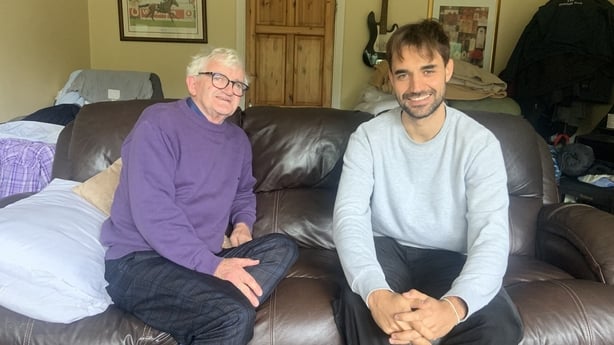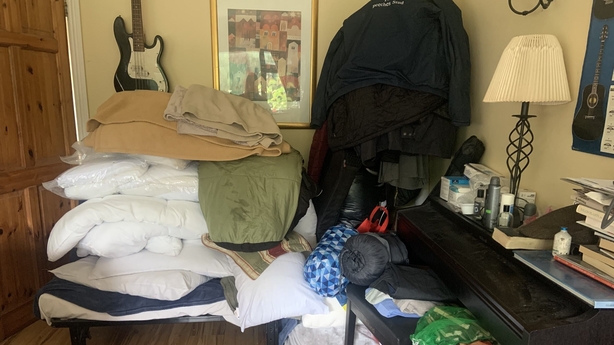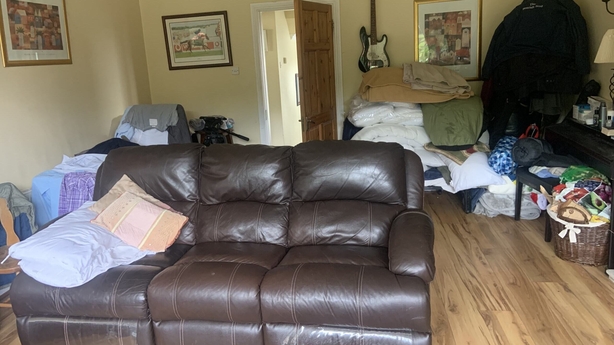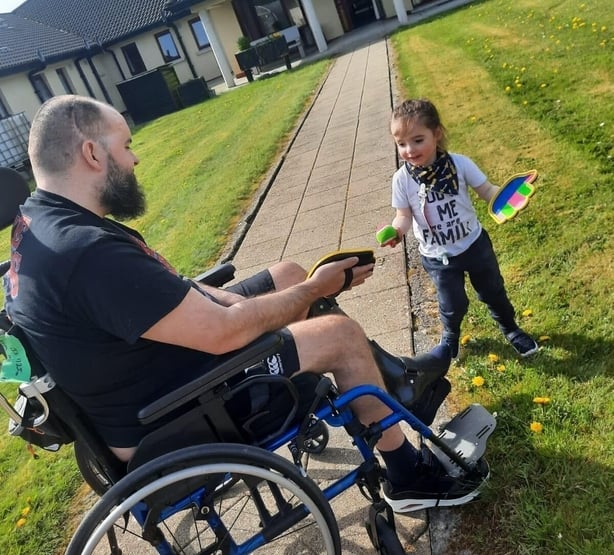As part of an ongoing series of reports on key local election issues around the country, RTÉ Midlands Correspondent Gail Conway reports on how housing shortages and a lack of affordable accommodation to rent or buy in Athlone, Co Westmeath, are impacting on people in the community.
A strong university town, more and more students are coming to Athlone to study, but for the majority trying to find somewhere to live is a challenge.
Around 7,000 students attend the Technological University of the Shannon (TUS) Athlone campus, an increase of approximately 500 since 2022, according to the Student Union's Welfare Officer Darcy Lawless.
With a new science, technology, engineering, and mathematics (STEM) building also under construction, even more students are expected to attend the campus in the next year or two.
"My big concern is the lack of accommodation. It's a massive election issue at this moment in time, particularly with the ongoing refugee crisis. We've lost the inherent student accommodation that we had," Mr Lawless said.
He believes around 70% of students commute, which is affecting the student experience, as well as increasing financial pressures due to the cost of petrol.

"It definitely has taken its toll on people who are commuting because I see a lot of people who are dropping out, they come to my office for help at the start of the year, or coming towards exams they’re stressed and tired. I think student accommodation would ease a lot of these concerns," he said.
Fr Shay Casey, TUS Chaplain and Pastoral Care, has worked with students for nearly 40 years and has run the Chaplaincy Open House in Auburn Heights since the 1980s.
He said he has never seen such a shortage of student beds in the town. All the bedrooms in the open house are full, while couches and the floor in the sitting room are regularly occupied.
He said: "It's always a headache, we have lived on the edge for maybe three or four years now. Landlords who traditionally took students are taking refugees in now not just Ukrainians, but people who are looking for accommodation and sometimes the government is paying serious money for those places. We can't compete with that."

Fr Shay is concerned that the situation has deteriorated further as some landlords who availed of a Government tax relief scheme are no longer involved in it.
"Many years ago there was a government scheme called Section 50 where people got tax relief for building, but the condition was that they would keep students in the building for at least ten years.
"By and large, those things have expired now, so people are maybe finding it more financially viable to have people other than students live in there.
"There's such a demand for housing and accommodation, that it is being gobbled up by people who are not students anymore," said Fr Shay.

There are proposals for dedicated student accommodation to be built close to the campus, but it could take years before they come to fruition.
"There's this kind of malaise, 'we'll try to make it happen’, but it never seems to get solved, and that's really frustrating at times," he said.
"We need to build at least say, maybe the guts of 1,000 rooms for student accommodation."
He explained that a former Marist Brothers premises in the town known as ‘Champagnat House’ is now home to international students.
PhD student from Italy Massimiliano Zanotto helps Fr Shay with administration at Champagnat House.
He has lived at the open house and now volunteers offering support to other international students arriving here.

Mr Zanotto said: "I come from a different background from the students that are currently having this problem.
"I came here seven years ago, and the problem wasn't as big back then, in terms of availability of accommodation as well as prices.
"The prices have gone very much higher than they were when I first came here.
"The college is growing a lot, which is good for us all because it's a university town, but it's not just the college that needs to grow, this whole infrastructure needs to improve as well."
Read more Elections 2024 stories
It is estimated that around 1,300 houses are due to be built in Athlone in the next five years.
But with the population increasing, supply is significantly slower than demand.
Some of the main concerns centre around the lack of social or affordable housing, rental costs, the squeezed middle-income earners with no rent supports as well as other people in society that are often forgotten about.

Joanne Greene’s plans have all been put on hold, after her partner Keith, and father of their three-year-old son Archie, suffered a stroke in 2022 and currently needs to use a wheelchair.
The couple who are renting a bungalow in Glasson were both working and saving for a mortgage.
Since Keith had his stroke, they have not been able to live together as a family as their accommodation is not wheelchair accessible and cannot be adapted.
He is currently in assisted living in Co Offaly and must travel to Co Tipperary twice a week for physiotherapy.
"An uncle of mine built a ramp at the front door, so he can come in the front door, he can come into the sitting room, and he can go into the dining room.
"But he can't go in anywhere else, because there's not enough space in the house, it is too small for him now," said Ms Greene.

She said it is "all hands-on deck" to try and get a suitable house so they can live together again and get some sort of normality as a family.
"There is nowhere, unfortunately, and even the new houses that are being built, even bungalows, they're not actually wheelchair accessible," said Ms Greene.
A recent member survey conducted by the Irish Wheelchair Association (IWA) found that more than 90% of their membership are planning to vote in the upcoming local and European elections.
An IWA spokesperson said: "The key to true independence for people with disabilities is having the opportunity to live independently with the necessary supports.
"The lack of wheelchair livable homes in the public and private sector is a crisis within a crisis for the thousands of disabled people."
The council is working with Ms Greene to help find her family a bungalow, but she is concerned that any that come on the market are too expensive and do not leave enough in the budget to adapt them.
"We probably will never be able to buy a house now. I can't see it anyways. With the way things have panned out for us. I think our only option is help from the council," she said.







